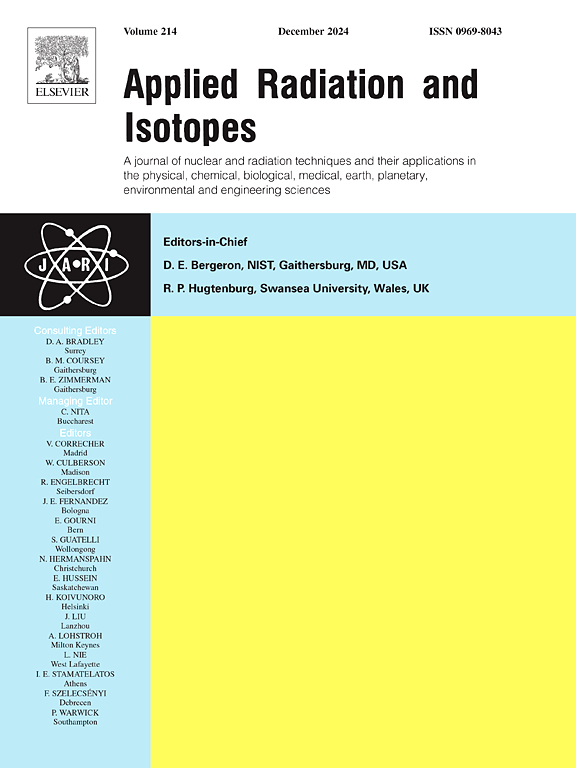Optimised neutron yield calculations from (α,n) reactions with the modified SOURCES4 code
IF 1.8
3区 工程技术
Q3 CHEMISTRY, INORGANIC & NUCLEAR
引用次数: 0
Abstract
The sensitivity of underground experiments searching for rare events such as dark matter, neutrino interactions or several beyond the standard model phenomena is often limited by the background caused by neutrons from spontaneous fission and () reactions. A number of codes exist to calculate neutron yields and energy spectra due to these processes. In this paper we present new calculations of neutron production using the modified SOURCES4 code with recently updated cross-sections for () reactions and the comparison of the results with available experimental data. The cross-sections for () reactions in SOURCES4 have been taken from reliable experimental data where possible, complemented by the calculations with EMPIRE 2.19/3.2.3, TALYS 1.96 or evaluated data library JENDL-5 where experimental data were scarce or unavailable. We present here our choice of the most reliable cross-sections for such calculations that match experimental data from alpha beams and radioactive decays.
(α,n)反应的优化中子产率计算与修改SOURCES4代码
寻找罕见事件(如暗物质、中微子相互作用或几种超出标准模型的现象)的地下实验的灵敏度通常受到自发裂变和(α,n)反应产生的中子所产生的背景的限制。存在一些代码来计算这些过程产生的中子产率和能谱。在本文中,我们提出了使用修改的SOURCES4代码和最近更新的(α,n)反应截面的中子产生的新计算,并将结果与现有的实验数据进行了比较。SOURCES4中(α,n)反应的截面尽可能取自可靠的实验数据,并辅以EMPIRE 2.19/3.2.3, TALYS 1.96或评估数据库JENDL-5的计算,其中实验数据很少或不可用。我们在这里提出了我们选择的最可靠的截面来进行这种计算,这些截面与来自阿尔法光束和放射性衰变的实验数据相匹配。
本文章由计算机程序翻译,如有差异,请以英文原文为准。
求助全文
约1分钟内获得全文
求助全文
来源期刊

Applied Radiation and Isotopes
工程技术-核科学技术
CiteScore
3.00
自引率
12.50%
发文量
406
审稿时长
13.5 months
期刊介绍:
Applied Radiation and Isotopes provides a high quality medium for the publication of substantial, original and scientific and technological papers on the development and peaceful application of nuclear, radiation and radionuclide techniques in chemistry, physics, biochemistry, biology, medicine, security, engineering and in the earth, planetary and environmental sciences, all including dosimetry. Nuclear techniques are defined in the broadest sense and both experimental and theoretical papers are welcome. They include the development and use of α- and β-particles, X-rays and γ-rays, neutrons and other nuclear particles and radiations from all sources, including radionuclides, synchrotron sources, cyclotrons and reactors and from the natural environment.
The journal aims to publish papers with significance to an international audience, containing substantial novelty and scientific impact. The Editors reserve the rights to reject, with or without external review, papers that do not meet these criteria.
Papers dealing with radiation processing, i.e., where radiation is used to bring about a biological, chemical or physical change in a material, should be directed to our sister journal Radiation Physics and Chemistry.
 求助内容:
求助内容: 应助结果提醒方式:
应助结果提醒方式:


